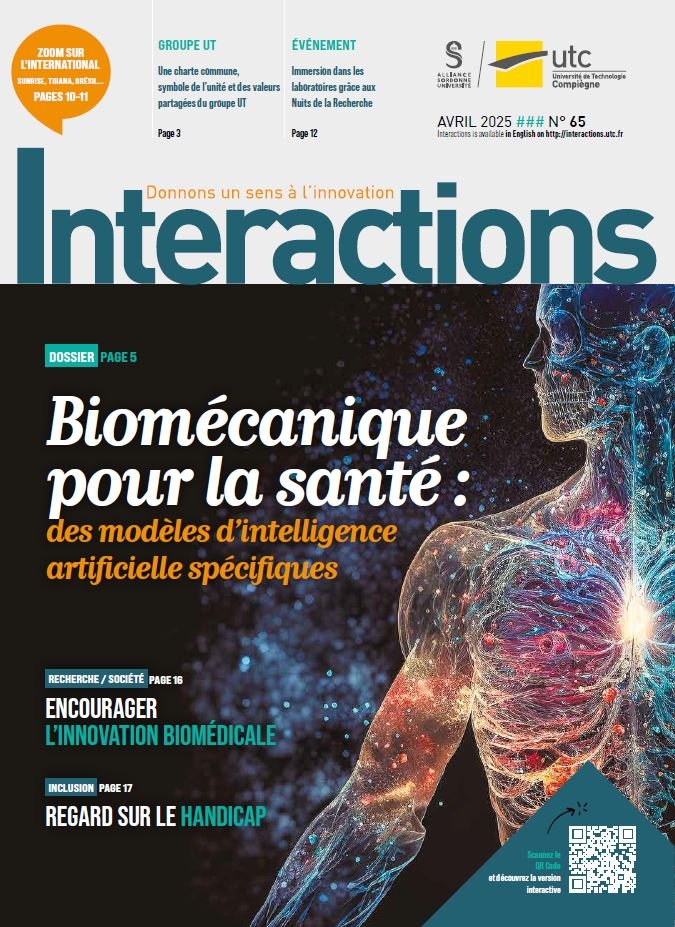The economist UTC engineer

Discovering and becoming your real self, honing your new-found potential, revealing yourself as a future professional; these are the leitmotifs of Compiègne University of Technology when it comes to defining the path of its students. With five specialties and twenty or so courses, students are “spoilt” when it comes to building their professional project. But some decide to venture down more winding paths and find their own way. This is the case of Matthieu Bordenave, 24 years old, freshly graduated from UTC and on his way to a career as an economist.
Matthew’s journey is like walking along a profile that seems traditional at first sight. He was first an excellent lycée student in his final science stream year and with his baccalaureate S in hand, Matthieu ventured into the first year of a scientific preparatory class. A course that did not suit him and he decided to leave after one year. He then went through the DUT before gaining admission to UTC’s third year «Of course I knew of UTC by reputation and I wanted to get into a training curriculum which mixes sciences and humanities.
So here he was, propelled at the dawn of autumn 2018 at UTC into UTC’s Mechanical Engineering major branch. Of his three years spent in the lecture halls of the engineering school, the young man has excellent souvenirs: «Following an engineering course allowed me to structure my thinking and to acquire practical skills in programming for example, he confides. It is also an intense multidisciplinary background with mechatronics, hydraulics, etc.»
But one meeting will definitively transform the destiny of the student-engineer, that of David Flacher, lecturer – doctoral supervisor — at the University of Paris 13, director of the research centre in Economics of Paris Nord and lecturer at UTC. I took a fascinating introductory course in economics and immediately the themes he was talking about spoke to me,» says the young man. I went to see him at the end of the course to ask him questions and to nourish my train of thought. Very quickly, an intellectual complicity was established between the student and his teacher; Mathieu was nourished by the recommendations of readings and conferences provided by his teacher, and the latter saw this student eager for knowledge kindly. And something obvious emerged in Matthieu’s mind: «I loved the courses I was taking as part of my engineering course, but I was passionate about economics,» he says. So for two years, while continuing his engineering course, the student enrolled at the CNAM to take economics classes by correspondence. This was enough to obtain 24 additional ECTS credits (CCs). This was a good complement to his engineering course and a solid passport to further studies in the field. After negotiations, he obtained an internship as a junior economist at the French Development Agency (AFD). This is a dream for any aspiring economist. «The approach to economics that I have is to rethink traditional models in the light of the climate and ecological transitions that we are going to undergo. AFD was an ideal playground to be able to advance in this sector. In February 2021, h e will join a department set up by Gaël Giraud, a renowned economist whose work has been unanimously acclaimed. The objective of his missions?
«To create a new economic model integrating climate and biodiversity loss into its analyses. The beginnings were complicated for the studentengineer. Long accustomed to physics problems and the arsenal of formulas to answer them, he found himself having to move through the economic literature in an attempt to develop the right formula to analyse the impacts of transitions in the economic world. It is a commitment that is above all personal. «Like many young people of my time, I wonder about the period we are living through and the impact it will have on individuals and the planet. With the support of the AFD, Matthieu Bordenave finally developed a model combining two studies: one theorised by Gaël Giraud himself and presenting the impact of temperature rises on the economy, the other found in the scientific literature and putting the economic impact of agroforestry into perspective. From his analysis it emerges, with calculations to back it up, that a halt to deforestation by 2050 and reforestation by 2100 could have substantial impacts on mitigating climate change. That is the broad outline. The details of his work are being written up in the privacy of his student room, and he plans to submit them to scientific journals in the coming weeks. «When I presented my research in my department, my tutor told me that if I worked even harder on formalizing my research process, I could expect a proper publication. This is a dream for anyone who plans to become a lecturerresearcher in economics.
The first UTC student admitted to the prestigious Erasmus Mundus Master’s degree
But before that, another dream came true in September: when he was admitted to follow EPOG, a prestigious Erasmus Mundus master’s programme, a collaboration between a dozen institutions and universities around the world, supported by the European Union. «The Economic POlicies for the Global transition master’s degree offers the best students from Europe and from the world the opportunity to study and work in the field of economics and transition policies. This two-year course, accessible in various European universities — including UTC — allows its students to explore the impact of digital, social and ecological transitions with economics overarching. Around 50 handpicked students are selected each year to join the Master’s programme. I am the first student from UTC to follow this programme,» says Matthieu. “It is a real pride for me because it allows me to go even further in my work in economics and to really consider launching a research career”.
The icing on the cake is that the student was part of the small cohort selected for a merit-based scholarship. «There were five of us in the entire class who obtained it, and it was an important signal to show my parents that even though I was an engineer, this new world of economics was open to me. For the future, Matthieu therefore plans to work in the world of research and teaching, with a strong emphasis on the world’s current ecological situation. There is still a long way to go for the young man who could, why not, lecture on economics at UTC in the future… (inter alia).




